International Day of Rural Women
October 15th is International Day of Rural Women. A day to recognize the important contributions that women and girls provide in sustaining food, water and livelihoods for homes and communities they live in. Women provide a large part of the care economy in rural areas. The care economy refers to the often unpaid work done around the household such as childcare, cooking & cleaning, and providing drinking water. According to the OECD the care economy makes up 9% of global GDP, valued at 11 trillion USD [1].
Each day women and girls spend over 200 million hours providing water
As part of their daily routine many rural women spend time and energy collecting water. Valuable time that could be used for other tasks, such as formal employment, getting an education, or starting a small business. Each day women around the world spend 200 million hours collecting water [2]. In addition to collecting water, women spend additional time purifying water often by boiling. In rural areas, this often involves searching for firewood, an additional chore itself. Boiling is not only time consuming, but also contributes to carbon emissions, and indoor house pollution. A study conducted by UC Santa Clara found that rural households in Java, Indonesia spend on average 4 hours per week providing drinking water for their families.
Nazava Water Filters Save Women 139 hours per year.
Since Nazava eliminates the need to boil or purchase water, the burden of providing clean drinking water is dramatically reduced. The aforementioned UC Santa Clara found that the women save on average 139 hours per filter per year by using Nazava. This data is supported by our own surveys where convenience is the most commonly cited benefit Nazava customers experience.
Nazava Water Filters work with micro-finance institutions (MFIs) such as Korperasi Baytul Ikhtiar in Indonesia and Equity Bank in Kenya, which specifically target rural women. The safe drinking water that Nazava provides are often used by women to support their businesses selling ice and mixed drinks. MFI’s help cover the initial upfront costs and allow customers to obtain a water filter and cover the payment installments.


Mrs. Shakhiroh has a small shop in a village in West Java, she uses water from Nazava to support her business. She purchased her Nazava Water Filter on credit from a micro-finance institution.
In addition to saving time and money, Nazava also empowers women by providing an additional source of income as an informal resellers. Nazava’s network of over 100 mostly female resellers earn on average US$26 per month in additional income, representing a 14 percent increase in monthly income.
This October 15th, take a moment to recognize Rural Women and their contributions to their communities. Using Nazava Water filters is just one small step towards creating a positive impact via increased savings, more time, and better health. Learn more about Nazava’s impact supporting rural women in our 2021 Annual Report!
By Noah Kercher, contributing author.

